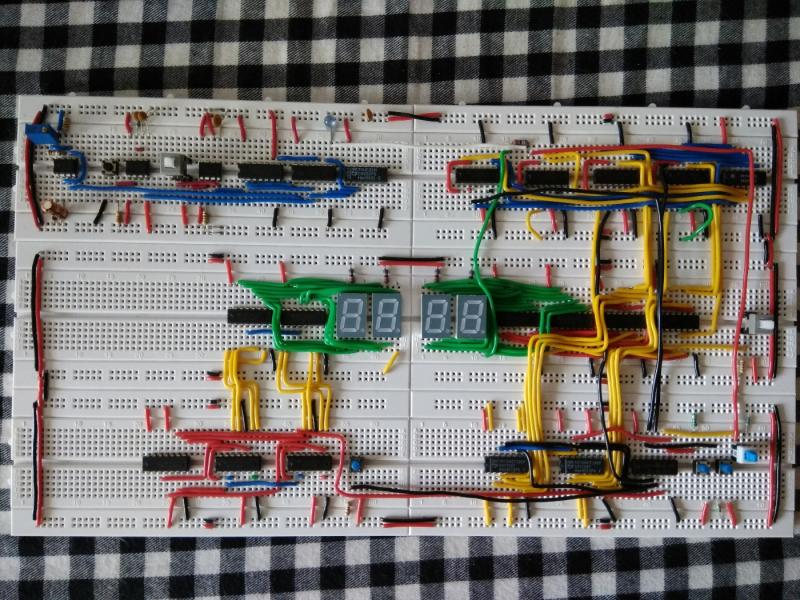Ranter
Join devRant
Do all the things like
++ or -- rants, post your own rants, comment on others' rants and build your customized dev avatar
Sign Up
Pipeless API

From the creators of devRant, Pipeless lets you power real-time personalized recommendations and activity feeds using a simple API
Learn More
Comments
-
 iAmNaN67507yI gave you a ++ before even reading, because I was sure it would be good. It is. But it's not the dancing pixies that are lethal, is it? I mean, its the swords of amperage that they wield that kill. A 100,000 volt pixie with a 0.01 Amp sword won't kill you, but a 10,000 volt pixie with 0.1 Amp sword? A definite killer if they land a good blow. Just a thought from a decidedly non-electrical engineering type person.
iAmNaN67507yI gave you a ++ before even reading, because I was sure it would be good. It is. But it's not the dancing pixies that are lethal, is it? I mean, its the swords of amperage that they wield that kill. A 100,000 volt pixie with a 0.01 Amp sword won't kill you, but a 10,000 volt pixie with 0.1 Amp sword? A definite killer if they land a good blow. Just a thought from a decidedly non-electrical engineering type person. -
 Condor315487y@iAmNaN hmm, kinda and kinda not. It's kinda true if you're talking about current-limited supplies or any kind of supply where your use of it makes the voltage collapse (e.g. connecting an LED to a button cell). But most high voltage supplies aren't like that and will happily supply a lethal amount of current while maintaining their lethal voltage.
Condor315487y@iAmNaN hmm, kinda and kinda not. It's kinda true if you're talking about current-limited supplies or any kind of supply where your use of it makes the voltage collapse (e.g. connecting an LED to a button cell). But most high voltage supplies aren't like that and will happily supply a lethal amount of current while maintaining their lethal voltage.
Essentially the dangerous part of electrical supplies isn't the current going through them (you can safely parallel yourself to a car battery while it's cranking at 100s of amps, because the current going through your body is 0) but try doing that to a 50+V supply and it may be able to push a lethal amount of current through you.
Essentially the amount of electromotive force that the electrons have (voltage) over whatever you put across it, hand in hand with how large an army there is of them (ampacity) is what determines the dangerousness. But for most high voltage supplies, it's safe to assume that the army of them will be quite large.. hence why the warning signs say "high voltage" and not "high current" 🙂
There are some exceptions like this 10kV arc lighter that I've made earlier that I've touched a couple of times (and survived because it is current-limited in a sense and due to conductor skin effect) but for all intents and purposes, a high voltage supply should be considered lethal until proven otherwise by a thorough analysis. -
You didn't mention differential circuit breakers, aren't those supposed to be an extra precaution?
-
 Condor315487y@ohemelaar yes but only if it's a ground fault, it doesn't protect from live to neutral contact.
Condor315487y@ohemelaar yes but only if it's a ground fault, it doesn't protect from live to neutral contact.
Edit: also they're really more of a thing to prevent metal enclosures from going live than they're a protection feature against electrocution. It should break when you have a live to ground contact but I wouldn't really rely on it 🤔 -
 Kaji20717y@Condor Your battery example reminds me of something that happened to me as a curious teen back in the day.
Kaji20717y@Condor Your battery example reminds me of something that happened to me as a curious teen back in the day.
Used to make a point of disassembling my disposable cameras from camp whenever the film was sent off for development, and this time in particular I was excited because it was my first time getting a camera with a flash on it.
After getting the cardboard off I took a moment to examine it, with my thumb resting on the side of the AA battery. My index finger on my other hand then contacted the top of the flash, which sent a current up one arm, behind my eyes, and down the other arm before setting off the flash (and, presumably, breaking the circuit?). One of the weirdest feelings I'd experienced up until that time. Didn't think much of it at the time, but the guys at electronics.SE seem to think it's a miracle it didn't turn out worse. -
@BurnoutDV GOD DAMN IT YOU. YOU CANT JUST POST SUCH THING AND THROW ME IN A INFINITE LOOP OF NOSTALGIA!!
They were good days man... Good days....... -
 Condor315487y@Kaji most certainly, those flash capacitors are usually charged to 300 or so volts. Hand-to-hand contact with that could've easily resulted in fibrillation and consequently death.. I'm glad you're still with us 🤗
Condor315487y@Kaji most certainly, those flash capacitors are usually charged to 300 or so volts. Hand-to-hand contact with that could've easily resulted in fibrillation and consequently death.. I'm glad you're still with us 🤗 -
@Condor lol defibrilator. Nice to get it tho if you do such things.
Ps: you’ve got a discord message :)
Related Rants



 From today, this beauty is 'ticking' on my desk :D
From today, this beauty is 'ticking' on my desk :D Today at school I borrowed an oscilloscope and a few capacitors and used a circuit I made at home to just demo...
Today at school I borrowed an oscilloscope and a few capacitors and used a circuit I made at home to just demo... My Mini-project for college. Any electronics enthusiasts here?
My Mini-project for college. Any electronics enthusiasts here?
I've noticed something odd lately.. every time I mention mains electricity in certain EE forums, people tend to go "you are a madman for wanting to use that 🤨".
To which I think in my head, sure it's a dangerous thing, after all the angry pixies that dance back and forth are kind of angry (120V) or actually insane (230V) depending on where you live.. but to mindlessly tell people to not use it at all, as an electronics engineer.. what's up with that?
I mean, it's a matter of respecting its power, right. So whenever I work with it, thick gloves, keeping my exposed lines as tiny as possible, keeping them around for as short as possible, properly insulating anything permanent, and even asking my landlord to install a defibrillator for when things still go horribly wrong (to which she agreed because it'd be useful to the other residents as well, yay 😁) are kinda mandatory.
And that's for the same reason essentially that precautions are taken when climbing a mountain by having climbing shoes, connecting yourself to pikes jammed into the mountain over a strong metal wire in case things go wrong, etc etc. And for the same reason that you don't climb a ladder in high heels and so on. Obvious, right.
Point is, inexperienced people indeed shouldn't be working with mains AC at all and that's the reason that I've avoided it in the first year or 2 of learning about electronics. But mindlessly telling people in EE forums that they're a redneck for working with the imminently lethal AC.. what's up with that?
Maybe I should just go find another electronics forum like the EEVblog forums over some random (kinda dead) electronics chat on Telegram though ¯\_(ツ)_/¯
question
electronics
mains ac